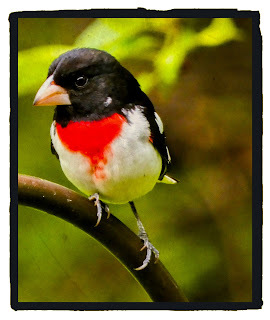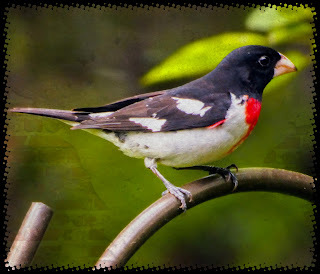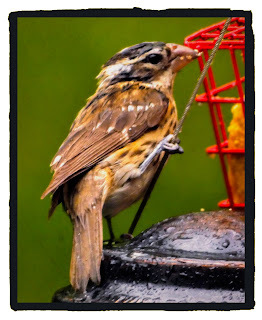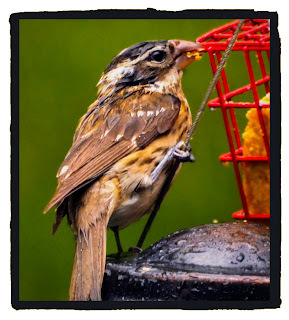R.L. Swihart's Blog, page 27
May 24, 2024
Melville: Bartleby
He lives, then, on ginger-nuts, thought I; never eats a dinner, properly speaking; he must be a vegetarian, then; but no; he never eats even vegetables, he eats nothing but ginger-nuts. My mind then ran on in reveries concerning the probable effects upon the human constitution of living entirely on ginger-nuts. Ginger-nuts are so called, because they contain ginger as one of their peculiar constituents, and the final flavoring one. Now, what was ginger? A hot, spicy thing. Was Bartleby hot and spicy? Not at all. Ginger, then, had no effect upon Bartleby. Probably, he preferred it should have none.
May 23, 2024
Melville: Bartleby
"True; but, with submission, sir, behold these hairs! I am getting old. Surely, sir, a blot or two of a warm afternoon is not to be severely urged against gray hairs. Old age — even if it blot the page — is honorable. With submission, sir, we both are getting old."
May 21, 2024
Melville: The Apple-tree Table
Aware that most disorders of the mind have their origin in the state of the body, I made vigorous use of the flesh-brush, and bathed my head with New England rum, a specific once recommended to me as good for buzzing in the ear. Wrapped in my dressing gown, with cravat nicely adjusted, and fingernails neatly trimmed, I complacently descended to the little cedar-parlor to breakfast.
Rose-breasted Grosbeaks (Male and Female)
May 4, 2024
Sebald: The Natural History ...
Here Kluge is looking down, both literally and metaphorically, from a vantage point above the destruction. The ironic amazement with which he registers the facts allows him to maintain the essential distance of an observer. Yet even Kluge, that most enlightened of writers, suspects that we are unable to learn from the misfortunes we bring on ourselves, that we are incorrigible and will continue along the beaten tracks that bear some slight relation to the old road network. For all Kluge’s intellectual steadfastness, therefore, he looks at the destruction of his hometown with the horrified fixity of Walter Benjamin’s “angel of history,” whose “face is turned toward the past. Where we perceive a chain of events, he sees one single catastrophe which keeps piling wreckage upon wreckage and hurls it in front of his feet. The angel would like to stay, awaken the dead, make whole what has been smashed. But a storm is blowing from Paradise; it has got caught in his wings with such violence that the angel can no longer close them. This storm irresistibly propels him into the future to which his back is turned, while the pile of debris before him grows skyward. This storm is what we call progress.”89
May 3, 2024
New Poem in Quadrant Magazine: October ...
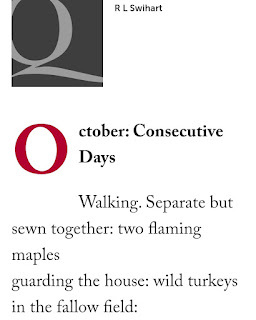
New Poem in Quadrant Magazine (May 2024). You can buy the magazine, read the "tease" above, or follow the link below (where you should be able to read the whole poem). Thanks to Barry Spurr and staff at Quadrant.
"October: Consecutive Days"
https://quadrant.org.au/magazine/2024...
#rlswihart #quadrantmagazine #may3024 #october:consecutivedays #nature #poetry #beauty #deathoffriend #readmorepoetry2024🎈♥️🪶
From Sebald's The Natural History of Destruction
Central to Kluge’s detailed description of the social organization of disaster, which is preprogrammed by the ever-recurrent and ever-intensifying errors of history, is the idea that a proper understanding of the catastrophes we are always setting off is the first prerequisite for the social organization of happiness. However, it is difficult to dismiss the idea that the systematic destruction Kluge sees arising from the development of the means and modes of industrial production hardly seems to justify the principle of hope. The construction of the strategy of air war in all its monstrous complexity, the transformation of bomber crews into professionals, “trained administrators of war in the air,”84 the question of how to overcome the psychological problem of keeping them interested in their tasks despite the abstract nature of their function, the problems of conducting an orderly cycle of operations that involve “200 medium-sized industrial plants”85 flying towards a city, and of the technology ensuring that the bombs would cause large-scale fires and firestorms—all these factors, which Kluge studies from the organizers’ viewpoint, show that so much intelligence, capital, and labor went into the planning of destruction that, under the pressure of all the accumulated potential, it had to happen in the end.
April 29, 2024
The Keteru (NZ Pigeon)


The Kereru (NZ Pigeon) @ Orana Wildlife Park in Christchurch NZ. Happy Monday and take things easy (if you can). There's "life" and then there's "real life.";)♥️🎈
#rlswihart #newzealand #christchurch #oranawildlifepark #pigeonsofinstagram #kereru #nzpigeon #nature #beauty #poetry #mondaymonday #readmorepoetry2024🎈
From Sebald's A Place in the Country
Yet the way in which Walser then breathes life into them, in an act of complete assimilation and empathy, reveals how in the end emotions are perhaps most deeply felt when applied to the most insignificant things. “Indeed,” Walser writes about ash, “if one goes into this apparently uninteresting subject in any depth there is quite a lot to be said about it which is not at all uninteresting; if, for example, one blows on ash it displays not the least reluctance to fly off instantly in all directions. Ash is submissiveness, worthlessness, irrelevance itself, and best of all, it is itself pervaded by the belief that it is fit for nothing. Is it possible to be more helpless, more impotent, and more wretched than ash? Not very easily. Could anything be more compliant and more tolerant? Hardly. Ash has no notion of character and is further from any kind of wood than dejection is from exhilaration. Where there is ash there is actually nothing at all. Tread on ash, and you will barely notice that you have stepped on anything.” The intense pathos of this passage—there is nothing which comes near it in the whole of twentieth-century German literature, not even in Kafka—lies in the fact that here, in this apparently casual treatise on ash, needle, pencil, and matchstick, the author is in truth writing about his own martyrdom, for these four objects are not randomly strung together but are the writer’s own instruments of torture, or at any rate those which he needs in order to stage his own personal auto-da-fé—and what remains once the fire has died down.
April 28, 2024
From Sebald's A Place in the Country
This description of the distinctly melancholic scrawl is reminiscent of the blue sheets of paper that Keller used as blotters as he toiled over his Bildungsroman at his desk in Berlin, and which over and over again repeat the name of his unrequited love in long intricately entwined lines, swirls, columns, and loops in a myriad variations—Betty Betty Betty, BBettytybetti, bettibettibetti, Bettybittebetti [Bettypleasebetti] is scrawled and doodled there in every calligraphic permutation imaginable. And around and between these five or six letters there is nothing, save here and there a sketch of a gateway to a walled garden, also with Betty inscribed above it, a Betty-mirror, a Betty-room, and a Betty-clock and next to it a Reaper, and another skeleton playing the fiddle, a funeral bell, and a kind of miniature coat of arms in which, through a magnifying glass, something can be made out which looks like a heart pierced through with pins. The art of writing is the attempt to contain the teeming black scrawl which everywhere threatens to gain the upper hand, in the interest of maintaining a halfway functional personality.

